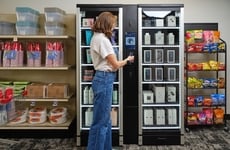
Unilever Partnered with Serioplast on 3D-Printed Packaging Solutions
Colin Smith — May 12, 2025 — Social Good
References: serioplast & voxelmatters
Unilever, a global fast-moving consumer goods company, has collaborated with Serioplast, a packaging manufacturer, to implement 3D printed molds within its packaging development process. This initiative utilizes stereolithography (SLA) 3D printing technology to produce molds for the stretch blow molding process, enabling the fabrication of realistic packaging prototypes. By replacing traditional metal tooling—typically associated with lead times of six to twelve weeks and significant cost implications—this approach has resulted in a reduction of both production lead times and tooling expenses by up to 90% during the prototyping phase.
In addition to cost savings, the adoption of 3D printed molds contributes to enhanced sustainability in the packaging manufacturing process. The technology minimizes material waste and energy consumption by reducing dependency on conventional metal tooling and supports a more iterative design approach. This streamlined workflow facilitates rapid adjustments to packaging designs in response to market demands while simultaneously promoting resource efficiency and a lower environmental impact, thereby aligning with broader sustainability objectives in the industry.
Image Credit: Unilever, Serioplast
In addition to cost savings, the adoption of 3D printed molds contributes to enhanced sustainability in the packaging manufacturing process. The technology minimizes material waste and energy consumption by reducing dependency on conventional metal tooling and supports a more iterative design approach. This streamlined workflow facilitates rapid adjustments to packaging designs in response to market demands while simultaneously promoting resource efficiency and a lower environmental impact, thereby aligning with broader sustainability objectives in the industry.
Image Credit: Unilever, Serioplast
Trend Themes
1. Accelerated Prototyping - The use of 3D-printed molds significantly decreases production lead times, allowing for faster iteration and quicker product-to-market transitions.
2. Sustainable Manufacturing - Introducing 3D printing into packaging molds reduces material waste and energy use, aligning with increasing environmental consciousness and sustainability goals.
3. Cost-effective Tooling - By minimizing the reliance on expensive metal tooling, 3D printing technology sharply cuts down prototype production costs.
Industry Implications
1. Fast-moving Consumer Goods - In the FMCG sector, implementing 3D-printed molds can transform production efficiency, allowing brands to rapidly respond to consumer trends.
2. 3D Printing Technology - The advancement and adoption of stereolithography by companies highlight its growing importance and potential for disruption in traditional manufacturing processes.
3. Sustainable Packaging - Increased focus on environmentally friendly practices in packaging pushes industries to innovate with resource-efficient production techniques like 3D printing.
9.5
Score
Popularity
Activity
Freshness























